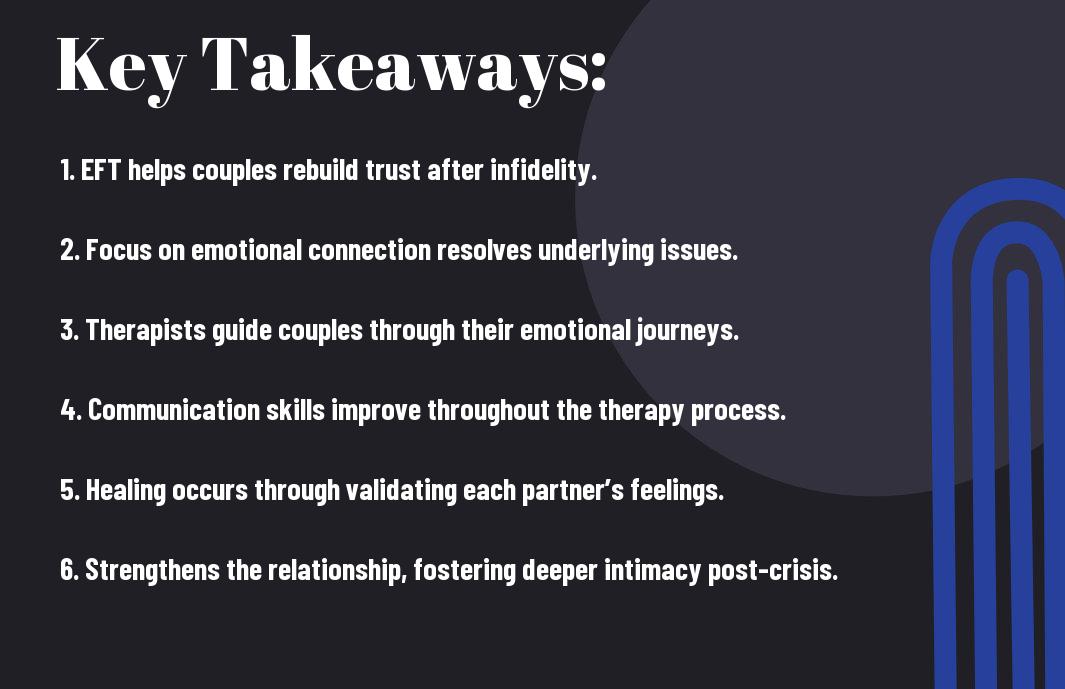Many couples facing the heart-wrenching challenge of infidelity find themselves at a crossroads, unsure of how to heal and rebuild trust. Emotionally Focused Therapy (EFT) offers a transformative approach by focusing on the emotional bond between partners, helping you to reconnect and address deeply rooted issues. This innovative therapy is designed to guide you through the pain of betrayal, fostering understanding and empathy that can lead to profound healing. If you want to turn your relationship around and create a stronger foundation, EFT may be the game-changer you need.
Key Takeaways:
- Emotionally Focused Therapy (EFT) addresses the emotional disconnection often caused by infidelity, facilitating open communication between partners.
- The therapy aims to help couples rebuild trust and strengthen their emotional bond by exploring underlying feelings and attachment needs.
- EFT provides a structured framework that allows partners to express their emotions and vulnerabilities in a safe environment.
- Infidelity is viewed through the lens of attachment theory, which helps partners understand their reactions and behaviors in the context of their relationships.
- Therapeutic interventions focus on creating new patterns of interaction, shifting from blame to empathy and understanding.
- EFT is designed to encourage healing and promote a collaborative approach to resolving the aftermath of betrayal.
- Success in EFT often leads to decreased anxiety and improved emotional regulation, fostering resilience in the couple’s relationship.


Understanding Infidelity
For many couples, infidelity can serve as a devastating turning point in relationships. It challenges trust and often leads to significant emotional upheaval. Understanding the underlying dynamics of infidelity is necessary to healing and moving forward.
Definition and Types of Infidelity
For a clearer understanding, let’s define infidelity and explore its various types:
| Definition | Engaging in romantic or sexual acts outside the committed relationship. |
| Emotional Infidelity | Forming a deep emotional connection with someone outside the relationship. |
| Physical Infidelity | Engaging in sexual activities with someone other than your partner. |
| Cognitive Infidelity | Having fantasies or thoughts about someone else while in a committed relationship. |
| Cyber Infidelity | Using the internet to engage in romantic or sexual conversations and activities. |
Recognizing the different types of infidelity can help you understand the specific challenges you may face in your relationship.
Emotional Impact on Relationships
Impact is profound when infidelity occurs in a relationship. It often leads to feelings of betrayal, anger, and heartbreak, which can destabilize the very foundation of your connection.
Plus, the emotional fallout can manifest in anxiety, depression, and a lingering distrust that complicates reconciliation. Communication may break down, making it difficult to address underlying issues. You might find yourself questioning your worth or experiencing intense jealousy towards your partner. Navigating these emotions is necessary for recovery, and it’s vital to seek the right support to regain stability and trust in your relationship.
Overview of Emotionally Focused Therapy (EFT)
Even in the midst of relational turmoil, Emotionally Focused Therapy (EFT) offers a beacon of hope. This clinically effective approach focuses on fostering secure emotional connections between partners, helping them navigate the complex emotions that arise during crises, such as infidelity. By facilitating understanding and empathy, EFT enables couples to rebuild trust and strengthen their bond, making it a transformative tool in relationship recovery.
Origins and Development of EFT
Against a backdrop of traditional behavioral therapies, EFT was developed in the 1980s by Dr. Sue Johnson and Dr. Les Greenberg. Their innovative approach combined principles from attachment theory and systemic therapy, focusing on the emotional needs and responses of partners. This groundbreaking development aimed to restore emotional safety and connection in distressed relationships, particularly in the context of attachment, paving the way for a more compassionate understanding of partnerships.
Key Principles and Techniques of EFT
Overview of EFT reveals that its effectiveness lies in several key principles and techniques that prioritize emotional bonds. The therapy journey initiates with identifying negative interaction patterns that contribute to distress, allowing you to recognize your emotional responses and those of your partner. By facilitating open communication about feelings, EFT encourages vulnerability and fosters emotional engagement, paving the way toward healing.
The foundation of EFT rests on the principles of attachment theory and emotional responsiveness. The therapy engages you and your partner in identifying and expressing core emotions, replacing damaging behaviors with empathy-driven interactions. Techniques such as the reframing of negative cycles and heightening emotional access empower you to reconstruct your bond. This process not only addresses the pain of infidelity but also aids in developing a resilient emotional foundation for the future.
The Role of EFT in Addressing Infidelity
To effectively address infidelity, Emotionally Focused Therapy (EFT) provides a structured approach that focuses on healing emotional wounds and rebuilding trust. By fostering a deep understanding of emotional responses, EFT helps couples navigate the complexities of betrayal. For more insight, check out Why choose EFT for Your Affair Recovery.
Recognizing Patterns of Emotional Disconnection
Recognizing the patterns of emotional disconnection is the first step towards healing after infidelity. This involves identifying the recurring cycles of negative emotions and behaviors that have led to a breakdown in your relationship. These patterns often contribute to feelings of isolation, frustration, and betrayal, making it necessary to understand how they manifest in your interactions.
Facilitating Open Communication and Vulnerability
By facilitating open communication and vulnerability, EFT encourages partners to share their feelings and fears without judgment. This safe space allows you to express your concerns and desires, fostering greater intimacy in the relationship. Through this process, both partners can move towards a deeper understanding of each other’s emotional needs.
Communication is the foundation for healing in any relationship, especially after infidelity. By engaging in open dialogues, you can effectively address feelings of anger, disappointment, and hurt. This means allowing yourself to be vulnerable and expressing your genuine emotions, fostering a sense of safety. The more you embrace honesty and transparency, the easier it becomes to rebuild trust. The positive outcome of this approach is a deeper, more fulfilling connection, where both partners feel nurtured and understood.
Case Studies: EFT in Action
All of the following case studies illustrate the transformative power of Emotionally Focused Therapy (EFT) for couples dealing with infidelity:
- Couple A: 75% improvement in communication after 8 sessions.
- Couple B: Reestablished trust with a 90% satisfaction rate within 6 months.
- Couple C: 80% reported a decrease in emotional distress after 10 sessions.
- Couple D: 85% success rate in resolving attachment issues following infidelity.
Success Stories of Rebuilding Trust
Behind every successful couple lies a story of resilience and healing. Couples who utilized EFT have reported experiencing profound transformations, with many noting a renewed sense of trust and intimacy. One couple, after facing betrayal, embraced the EFT process and found themselves not only rebuilding their relationship but also experiencing deeper emotional connections than they had previously thought possible.
Challenges and Resolutions
One common hurdle in the EFT journey is the difficulty of confronting painful emotions tied to infidelity. Couples often navigate complex feelings of anger and betrayal, which can lead to intense disagreements. However, through the guidance of a skilled EFT therapist, couples can identify these emotions and work towards resolution, setting the stage for healing. You may find that open communication and emotional vulnerability foster resilience in overcoming these challenges.
Understanding the emotional landscape of infidelity is vital. Couples often have to address patterns of avoidance or withdrawal that can exacerbate their issues. By exploring underlying attachment styles and learning effective tools for engagement, you can create a safe space to express feelings. While facing these issues is often uncomfortable, the outcomes can be immensely rewarding, leading you to a place of renewed commitment and connection.

Comparing EFT with Other Therapeutic Approaches
Many therapists explore different methods when addressing infidelity, and understanding the distinctions between Emotional Focused Therapy (EFT) and other approaches can enhance your healing journey.
| Therapeutic Approach | Key Characteristics |
|---|---|
| Traditional Talk Therapy | Focuses on discussing feelings and thoughts, often lacking structured interventions. |
| Cognitive Behavioral Therapy (CBT) | Addresses negative thought patterns and behaviors but may overlook emotional connection. |
| Emotionally Focused Therapy (EFT) | Prioritizes emotional bonds, fostering attachment and communication between partners. |
Traditional Approaches to Infidelity
At times, traditional approaches to infidelity can leave you feeling misunderstood, as they often focus solely on the cognitive aspects of the situation without addressing the underlying emotions or relationship dynamics. As a result, you may miss opportunities to rebuild emotional connections with your partner.
Unique Benefits of EFT
Along with bridging emotional gaps, Emotionally Focused Therapy offers a safe space to express feelings and vulnerabilities, facilitating deeper understanding between you and your partner. This approach actively works towards repairing the emotional bond and re-establishing trust, which is imperative for recovery.
Considering the effects of infidelity, EFT provides you with the opportunity to explore your emotions and those of your partner. This method centers around creating a secure attachment, thereby allowing you to rebuild intimacy and trust. Unlike other approaches, EFT encourages open communication while addressing underlying emotional issues, leading to enhanced connection. By focusing on the root causes of distress, EFT equips you with the tools to overcome the aftermath of infidelity and achieve lasting healing.
Practical Steps for Couples Considering EFT
Keep in mind that initiateing on the Emotionally Focused Therapy journey requires commitment and openness. Start by setting a collaborative mindset with your partner, acknowledging the desire to rebuild trust and intimacy. Approach the process with a willingness to explore emotions and vulnerabilities, as this will lay the groundwork for effective healing.
Finding a Qualified EFT Practitioner
To find a qualified EFT practitioner, begin by researching licensed therapists specializing in Emotionally Focused Therapy. Look for credentials, experience, and positive reviews from past clients. You might also consider asking for recommendations from trusted sources or searching online directories dedicated to EFT professionals.
Preparing for the EFT Process
Preparing for the EFT process involves both mental and emotional readiness from you and your partner. It’s beneficial to identify and express your individual feelings about the infidelity, and how these feelings impact your relationship. Establish a safe environment for open dialogue and focus on your shared goals of healing and reconnecting.
Process steps are imperative to ensure a productive experience in EFT. You should both prioritize honesty and vulnerability, as these are key to creating a safe space for discussion. Setting aside time for regular sessions and actively participating in exercises will foster honesty between you and your partner. It’s also vital to continually acknowledge and validate each other’s emotions throughout the process, reinforcing your commitment to rebuild the relationship. The process may be challenging, but it can lead to profound emotional growth and a stronger connection.
Summing up
Considering all points, Emotionally Focused Therapy (EFT) for infidelity presents a transformative approach to rebuilding trust and connection in your relationship. By focusing on emotional bonds, you can navigate the complexities of betrayal and foster deeper intimacy. EFT guides you and your partner through understanding and expressing your feelings, creating a safe environment for healing. Embracing this therapy can empower you to move past the pain of infidelity, ultimately paving the way for a stronger, more resilient partnership.
FAQ
Q: What is Emotionally Focused Therapy (EFT) and how does it relate to infidelity?
A: Emotionally Focused Therapy (EFT) is a structured approach to couples therapy that seeks to expand and reorganize emotional responses, aiming to restore the bond between partners. As far as infidelity, EFT helps partners address the underlying emotional issues that contributed to the breach of trust. It emphasizes understanding and reshaping emotional connections to facilitate healing and rebuild intimacy.
Q: How effective is EFT for couples dealing with infidelity?
A: EFT has shown significant effectiveness for couples grappling with infidelity. Research indicates that EFT can lead to improved communication, increased emotional responsiveness, and a more secure attachment style between partners. By focusing on emotional needs and creating a safe space for vulnerability, EFT helps partners navigate the complexities of infidelity and work toward reconciliation and healing.
Q: What are the stages involved in EFT for addressing infidelity?
A: Typically, EFT follows three main stages:
1. Bonding: Establishing a safe therapeutic environment where both partners can express their feelings without fear of judgment.
2. Understanding: Exploring the emotions and vulnerabilities that led to the infidelity, alongside the impact it had on both partners.
3. Rebuilding: Creating new patterns of interaction that foster emotional closeness and repair trust. Throughout these stages, the therapist guides the couple in understanding one another’s emotional experiences.
Q: How can partners prepare for an EFT session focused on infidelity?
A: Preparation for an EFT session typically involves partners reflecting on their feelings and experiences related to the infidelity. Writing down any emotions that arise, specific queries they want to discuss, and what they wish to achieve from the therapy can be beneficial. Open communication before the session about intentions and expectations can enhance the therapeutic process and help both partners feel more prepared.
Q: What long-term benefits can couples expect from using EFT after infidelity?
A: Couples who undergo EFT after infidelity can experience numerous long-term benefits, including improved communication skills, enhanced emotional connection, and a more profound understanding of each other’s needs. Over time, partners often develop a stronger relationship foundation, leading to greater resilience in facing future challenges, a more secure emotional attachment, and an overall healthier dynamic in the relationship.
